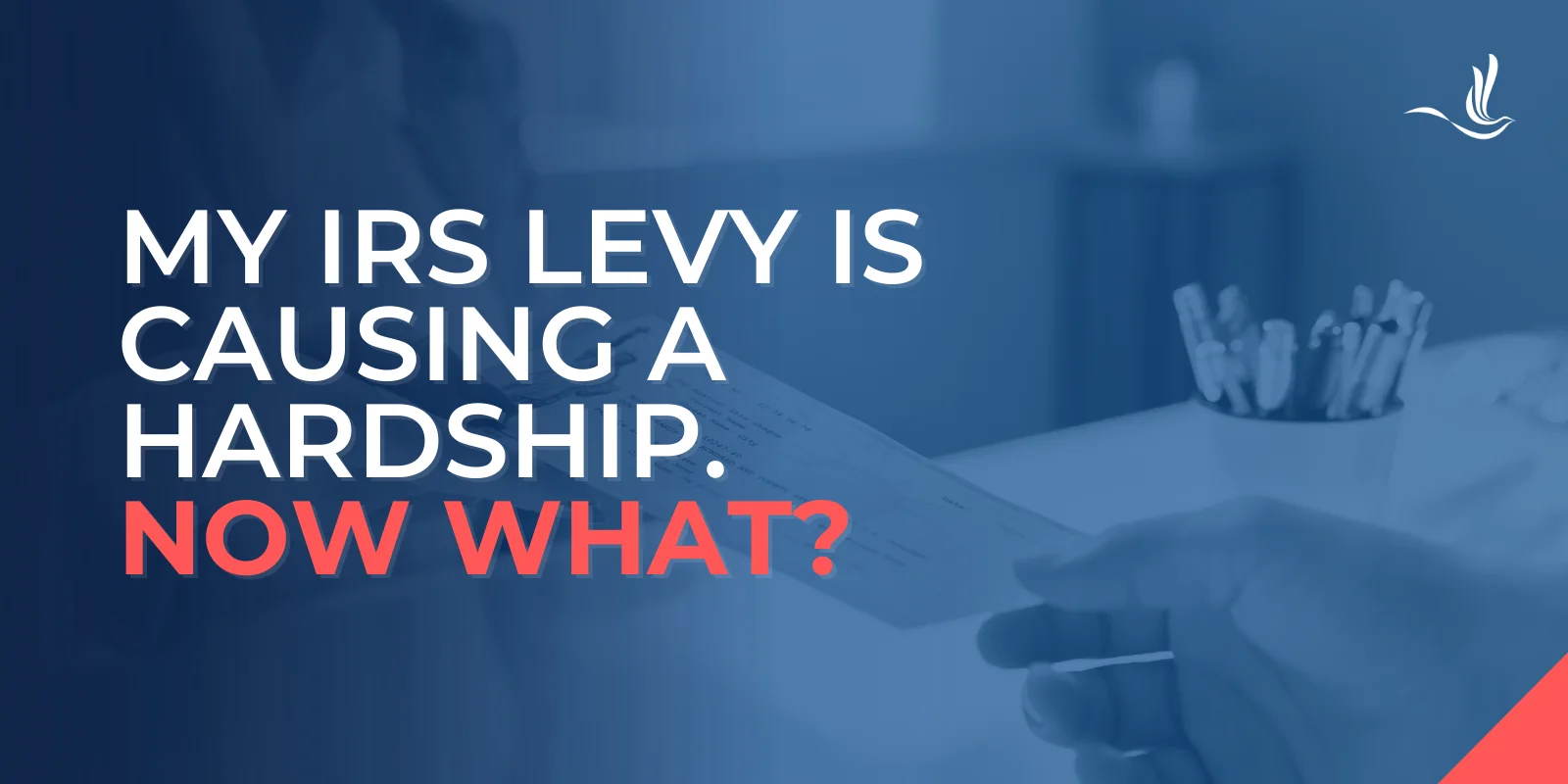Dealing with an IRS levy can be incredibly stressful, especially when it creates a significant financial hardship. A levy allows the IRS to legally seize your assets, such as bank accounts, wages, and other property, to satisfy a tax debt. If this action is making it difficult to cover basic living expenses, it’s essential to know your options for relief.
Understanding IRS Levy Hardship Relief and Tax Lien Removal
An IRS levy can quickly drain your finances, making it impossible to afford essentials like rent, food, utilities, and medical care. When the IRS seizes your wages, bank accounts, Social Security benefits, or other assets to collect unpaid taxes, it can create a severe financial hardship—one that leaves you struggling to cover even basic living expenses.
The IRS can even levy your spouse’s bank account if both of you are legally responsible for the tax debt. However, if you live in a community property state (such as California or Texas), the IRS may seize up to 50% of the funds in the joint account. If you are filing jointly, both spouses are generally responsible for the tax liability.
If your IRS levy is causing a financial hardship, you have the right to seek relief through various IRS programs, including levy release, installment agreements, and tax lien removal. The IRS is required to review hardship claims and, in many cases, will lift or modify a levy if it prevents you from meeting essential needs. However, navigating the process can be complex, requiring detailed financial documentation and proactive communication with the IRS.
What’s the Difference Between a Tax Levy and a Tax Lien?
Many taxpayers confuse tax levies and tax liens, but they serve different purposes:
A tax levy is the active seizure of your assets—such as wages, bank accounts, or property—to satisfy a tax debt.
A tax lien is a claim against your assets, meaning the IRS has a legal right to your property if you sell it, but they haven’t seized anything yet.
While levies result in immediate financial loss, tax liens can impact your ability to secure loans, mortgages, or new lines of credit. If you’re struggling with a levy or a lien, relief options are available to help stop collections and remove tax liens from your record.
Understanding the Situation: When an IRS Levy Causes Financial Hardship
Before seeking relief, it’s important to determine whether your IRS levy qualifies as a financial hardship under IRS guidelines. A financial hardship is typically defined as a situation where the levy leaves you unable to meet basic, reasonable living expenses. These include things like rent, utilities, food, and medical costs. If you’re struggling to pay for these necessities due to the levy, you may qualify for relief.
The IRS considers financial hardship on a case-by-case basis and typically follows the standards outlined in IRS Publication 594: The IRS Collection Process and the Collection Financial Standards, which outline allowable living expenses.
Examples of IRS Levy Hardship Situations
An IRS levy is likely causing financial hardship if it prevents you from affording:
Rent or Mortgage Payments: If the levy takes funds that would otherwise cover your housing costs, putting you at risk of eviction or foreclosure.
Utility Bills: If you are unable to pay for electricity, water, heating, or other essential services.
Food and Groceries: If the levy leaves you without enough income to provide meals for yourself or your family.
Medical Care or Prescription Costs: If you cannot afford necessary medications, health insurance premiums, or medical treatments due to the levy.
Child Support or Dependent Care: If the levy takes funds meant for legally required child support payments or necessary daycare expenses.
Transportation Costs: If the levy prevents you from making car payments, purchasing gas, or covering public transportation needed to commute to work.
Assets That Can Be Levied
While many people think of IRS levies as targeting only bank accounts or wages, the IRS has the authority to seize a wide range of assets, including:
Wages and Salary: The IRS can garnish a portion of your paycheck before you even receive it.
Bank Accounts: The IRS can freeze and withdraw funds directly from checking or savings accounts.
Retirement Accounts: In some cases, the IRS may seize funds from pensions, 401(k)s, and IRAs.
Business Assets: If you’re self-employed, the IRS can seize business income, accounts receivable, and even physical assets like equipment or inventory.
Property and Vehicles: The IRS may seize and sell real estate, personal vehicles, or other valuable property to satisfy tax debt.
If any of these levies severely impact your ability to afford basic necessities, you may qualify for hardship relief. The next steps involve proving your financial situation to the IRS and requesting a levy release or alternative tax relief option.
Request a Release of Levy: How to Get an IRS Levy Released Due to Hardship
If you believe the levy is causing a hardship, you can request the IRS to release it. The IRS is required to release a levy if it prevents you from meeting basic living expenses, but you must provide financial documentation proving that you qualify. However, it’s crucial to note that levy releases are not permanent. Even if the IRS approves your levy release due to hardship, this does not erase your tax debt. The levy can be reinstated later if you do not set up a repayment plan, such as an installment agreement or Offer in Compromise. Taking steps to resolve your tax debt after a levy release can prevent future collection actions.
Steps to Request a Levy Release Due to Hardship
To request a levy release, you’ll need to contact the IRS immediately. You can contact the IRS at the number provided on your levy notice. Be prepared to discuss your financial situation in detail.
Next, you’ll need to submit Form 433-A. This is a Collection Information Statement for Wage Earners and Self-Employed Individuals. It provides the IRS with a detailed picture of your income, expenses, assets, and liabilities. You may also need to submit documents such as pay stubs, bank statements, and bills to prove your financial hardship.
Once you submit your documentation, you’ll await IRS review. The IRS will assess your financial situation and determine whether the levy should be fully or partially released. If approved, the IRS will notify your employer or bank to stop the levy. If denied, you may need to appeal the decision or explore other tax relief options.
How long does it take for the IRS to release a levy due to hardship?
The time it takes for the IRS to release a levy depends on several factors, including how quickly you provide the required financial documentation. Typically, once the IRS approves your request for a levy release due to financial hardship, they may process it within 2-3 weeks. However, if more documentation is needed or if your case is complex, it may take longer. Be sure to stay in communication with the IRS to track progress.
Other Tax Relief Options
You can also look into other forms of tax relief if your IRS levy is causing a hardship.
Offer in Compromise: Settle Your Tax Debt for Less
An Offer in Compromise (OIC) is an agreement between you and the IRS that settles your tax debt for less than the full amount you owe. This option may be available if paying the full tax liability would cause financial hardship. While this option can provide significant relief, it’s important to understand that the IRS approves only a fraction of OIC applications. The process is rigorous, and you may want to consult a tax professional to increase your chances of success.
To apply, you must submit:
Form 656 (Offer in Compromise Application)
Form 433-A (Collection Information Statement), detailing your income, expenses, assets, and liabilities.
A nonrefundable application fee (unless you qualify for a low-income waiver).
If approved, your tax debt can be settled for a fraction of what you owe. If denied, you may still qualify for an installment agreement or Currently Not Collectible (CNC) status.
Installment Agreements: Avoid Levies and Remove Tax Liens
If you cannot pay your tax debt in full, an IRS installment agreement allows you to make monthly payments over time. Setting up an installment agreement can help you stop IRS collections, remove a tax lien, and even prevent future levies. When looking into installment agreements, you’ll need to decide which type is best for you:
Short-Term Payment Plan: For debts under $100,000, allows up to 180 days to pay.
Long-Term Installment Agreement: For debts under $50,000, allows monthly payments over several years.
Partial Payment Installment Agreement: Lets you pay a reduced amount over time, similar to an Offer in Compromise but without the full debt forgiveness.
Appeal the Levy: How to Stop an IRS Levy Through Appeals
If you believe the levy was wrongfully applied or if you disagree with the IRS’s decision to deny a levy release, you have the right to appeal. You can request a Collection Due Process (CDP) hearing, where you’ll have the opportunity to present your case. During this hearing, you have the right to challenge the validity of the levy or propose alternative resolutions, such as an OIC.
If the IRS denies your request for a levy release, you can escalate the case to the U.S. Tax Court within 30 days of the CDP decision. If your financial situation worsens, you can submit new evidence of hardship and request a reconsideration. If all appeals fail, consider working with a tax resolution firm to explore other legal options to stop the levy.
Seek Professional Help: Get Expert Assistance to Stop an IRS Levy
Dealing with an IRS levy can be overwhelming, especially when it’s draining your finances and making it difficult to cover essential expenses. While you can attempt to resolve the issue on your own, working with a trusted tax resolution firm like Optima Tax Relief can significantly improve your chances of getting the levy released and finding a long-term solution to your tax debt.
Why Work with Optima Tax Relief?
Stronger Negotiation Power: Our tax professionals have extensive experience working directly with the IRS and know how to present your financial hardship case effectively.
Better Installment Agreements: We can help negotiate lower monthly payments and work to reduce penalties or interest on your tax debt.
Higher Chances of Levy Release Approval: By properly completing and submitting Form 433-A and supporting documentation, our team can improve your chances of getting a levy released due to hardship.
Preventing Future Levies: We’ll help you set up a long-term tax resolution plan, such as an Offer in Compromise or Currently Not Collectible (CNC) status, ensuring that you don’t face levies in the future.
Every day that an IRS levy remains in place, the IRS can seize more of your income, making it harder to pay for rent, groceries, medical bills, and other essential expenses. Taking action now can stop the levy and help you regain control of your financial future.
Prepare for the Future: Avoid Future IRS Levies & Tax Liens
Once the immediate crisis is resolved, take steps to prevent future tax issues. Set up a payment plan with the IRS if you still owe back taxes and ensure that you stay current with all future tax obligations. Seek penalty abatement if you meet the qualification. Remember to file and pay your taxes on time every year. This is the best way to avoid any future IRS levies and tax liens. Consider working with a tax professional to manage your finances and avoid falling into similar situations in the future.
Tax Help for Those Being Levied by the IRS
An IRS levy can be overwhelming, but it’s important to know that options are available, especially if it’s causing a financial hardship. By taking proactive steps, communicating with the IRS, and seeking professional help, you can work towards resolving the issue and regaining financial stability. Optima Tax Relief is the nation’s leading tax resolution firm with over a decade of experience helping taxpayers.
If You Need Tax Help, Contact Us Today for a Free Consultation




























